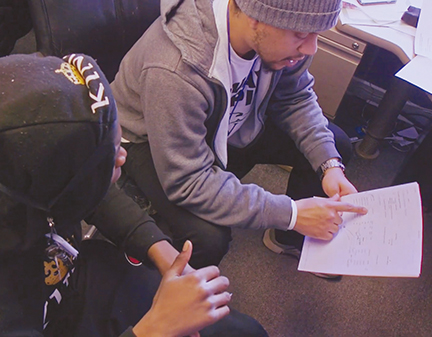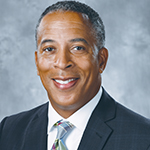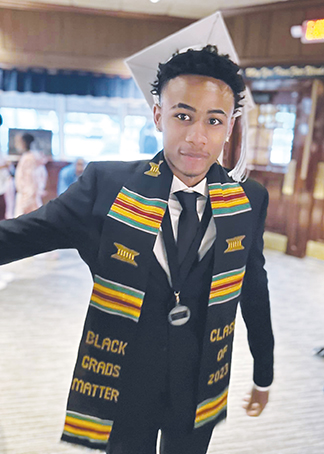Anell Eccleston remembers a conversation early in his relationship with a boy he was mentoring in which the boy mentioned that he expected to end up in jail.
"He didn't know how he was going to end up there, he just knew he would," recalls Eccleston, director of care and sustainability for the Student Advocacy Center of Michigan.

The boy was one of nine siblings in a family that had been touched by incarceration and poverty. The boy’s mother was unemployed most of the roughly three years Eccleston worked with the boy through the center, a nonprofit focused on keeping
students in school, supported and engaged.
One day, the boy told Eccleston that most of his brothers and sisters could not read at grade level. "From that point on, we ended up working on reading," Eccleston says, especially with materials that aligned with the boy's interest in cars.
The boy started to do better in math, science and reading. He went on to graduate from high school and is now an automotive mechanic.
The boy also got involved in the center’s youth-organizing program. "He was able to advocate for equitable policy," Eccleston says. "He was also able to take what we learned from that moment and extend that to support so many more."

Distributing dollars
Success stories like that and the nonprofit's history of serving the Ypsilanti community led Trinity Health Ann Arbor Hospital and Trinity Health Livingston Hospital to give the center a $50,000
Community Impact Grant, one of eight of varying amounts awarded by the hospitals this year. Both are part of the nine-hospital Trinity Health Michigan regional system.
Trinity Health Ann Arbor President Alonzo Lewis says the grants went to community groups or agencies focused on issues identified in the hospitals' community health needs assessments. For Trinity Health Ann Arbor, the priorities of the grants were: mental health and substance-use disorders; obesity and related illnesses; and preconceptual and perinatal health.
The goal of the grants is to strengthen successful community organizations and to seed or support unique programs, Lewis says. The Student Advocacy Center, he says, has a "meaningful impact on breaking the cycle of poverty."
"They’re improving mental health, social support and the life trajectories of our youth … who are struggling most with school," he adds.
Check & Connect
The Student Advocacy Center was founded in 1975. It is based in Ypsilanti, a city a few miles east of Ann Arbor with a population of about 20,000. Although 93% of the city’s adult residents are high
school graduates, about 30% of the population lives in poverty, according to the U.S. Census Bureau.
Part of the Student Advocacy Center's mission statement is: "A robust public education is a human right and essential to a thriving democracy." In addition to mentoring students, it assists those who are suspended, expelled, denied special education support or challenged by other barriers. The center offers a helpline for families whose kids are struggling in school and educational activities for kids. The center, which has 19 staff, also does community organizing to advocate for educational justice. Many of the students the center assists are from low-income and minority families.

Eccleston says the grant from Trinity Health will help the center "create sustainability in our programming." Specifically, he says the grant will be used for the center's Check & Connect program. One of his previous positions with the center was as a mentor in the program.
Established around 2012, Check & Connect aims to keep students in classrooms, with a focus on mental health and making connections to other therapeutic organizations. Students who are struggling with behavior in school, absenteeism or poor grades — all warning signs that they may disengage and drop out — get referred to the program by one of the center’s several community partners and paired with a mentor. Mentors and students connect weekly for at least two years.
With the COVID-19 pandemic and its restrictions over, Eccleston considers the biggest issue for youth to be social connectedness. The pandemic, he says, "really took everything a step back" for many students, including in how to engage with authority figures and be part of a team.
"It's almost like they had to relearn how to be a student again," Eccleston says.
Eccleston notes that while educators see keeping students in classrooms as vital to their long-term well-being, some schools have made that harder through a resurgence of so-called zero-tolerance policy practices. According to a Brookings Institution survey, most public schools had such policies, or "mandatory penalties for students who break certain rules," in place during the 2021-22 school year.

Eccleston says Check & Connect follows an "evidence-based education mentorship model" geared toward school completion by looking at the whole child. He estimates that 75-100 students are working with mentors through the program at any given time. The mentors are on the center's staff and get special training. "It's a very intentional and intensive program," Eccleston notes.
Full circle
Ky'Andre Vaughn, a 2023 high school graduate, is a recent participant in Check & Connect. Vaughn says he went through a rough patch his freshman year and his father, who was involved with a different
mentoring program, connected him with the Student Advocacy Center.
"At first I wasn’t too fond of it," Vaughn recalls. "It kind of seemed like, from my perspective at a young age, it was where kids go when they're in trouble or need guidance, or just don’t have enough help. I didn’t think of it in a positive way."
Once he got into the program, he learned it could be tailored to his own interests — basketball, in his case. The life lessons he got from his mentor were framed around the game, such as that it's OK to miss a shot and to stick with his pursuits.
"Now I think it's an awesome, amazing program," he says. "I think a lot of kids should definitely look into it."
From his experience, Vaughn says mentors at the Student Advocacy Center were there to listen along with providing guidance. "The biggest thing I learned was just to say yes," Vaughn says. "There are a lot of different opportunities and paths."
